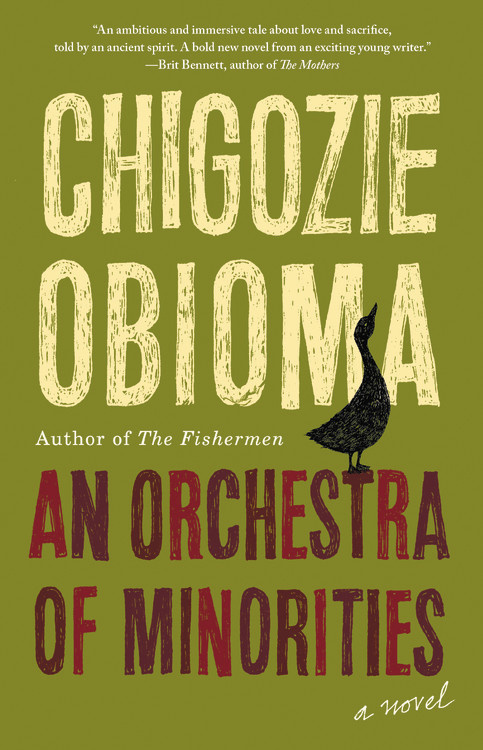“An Orchestra of Minorities,” Chigozie Obioma’s second novel, comes three years after his celebrated debut, “The Fishermen,” the story of a Nigerian Igbo family bedeviled by a fatal prophecy. That novel, a finalist for the Man Booker Prize, was superb in its sense of time and place, and in projecting a worldview very different from a Western one. The present book takes the Igbo understanding of the human predicament much further in that the entire story unfolds within a frame of Igbo cosmology. (The essentials of this are laid out in an introductory chart of its entities and ontological relationships.)
Chinonso Solomon Olisa is a young poultry farmer living in Umuahia, Nigeria, and his story is narrated as a form of testimony to Chukwu, the supreme deity of the Igbo people, by Chinonso’s “chi,” his guardian spirit. This particular chi has been around for hundreds of years and is a rueful commentator on human passions – on obsessive love, jealousy, anger and, above all, fear, the “subaltern god, the silent controller of the universe of mankind.” He – we will call this spirit “he” – constantly remarks on his and Chinonso’s inability to see the future and to recognize actions that will have cascading consequences and, in time, spell doom.
When we first meet Chinonso he is grieving for his father, nine months dead. In fact, he has never really gotten over the death of his mother, who died giving birth to the sister from whom he is now estranged. Chinonso, we soon see, is a lonely fellow who does not easily bear up against loss. His only solace is his chickens. One day, on his way back from buying additions to his flock, he comes upon a woman on a bridge who seems intent on throwing herself into the river, and he manages to dissuade her. She is, we learn later, Ndali, the daughter of a wealthy family, a woman distraught because she has just been jilted by her fiance. Some time later, she and Chinonso meet again and fall in love, conducting their affair amid power outages and the bustle of his beloved chickens.
On occasion the birds strike up a mournful song, a dirge that Chinonso’s father referred to as an “orchestra of minorities” – the only response small, insignificant creatures can make to cruel fate. Chinonso is, as things go, a small creature himself: Less educated and much poorer than Ndali, he is rejected and humiliated by her family. Hoping to elevate himself, he accepts the offer of an old schoolmate, Jamike, to arrange for him to attend a university in Cyprus. Thus, reports his chi, “the black seeds of his undoing came to root in his life.”
Chinonso sells his house, land and chickens, all that “had been part of him. He would live on from this moment like a living animal of the present whose tail is stretched permanently into the past.” He hands the money over to Jamike only to arrive in northern Cyprus, a wretched quasi state under Turkish occupation, to find that he has been swindled. He receives kindness from a fellow Nigerian and a German nurse, but a tragic momentum propels him onward through a grotesque sequence of calamities.
“An Orchestra of Minorities” is big novel of exile and tribulation, acted out, at one level, in a mythical realm, a cosmological territory crammed with sprits unfamiliar to most Western readers. At another level, the novel teems with people busy with down-to-earth matters of daily living, these often described by our disembodied narrator with dry, gloom-dispelling humor. The presence of this kindly chi, so concerned for the welfare of his hapless charge, makes this rich and tragic story bearable and rewarding.
Send questions/comments to the editors.



Success. Please wait for the page to reload. If the page does not reload within 5 seconds, please refresh the page.
Enter your email and password to access comments.
Hi, to comment on stories you must . This profile is in addition to your subscription and website login.
Already have a commenting profile? .
Invalid username/password.
Please check your email to confirm and complete your registration.
Only subscribers are eligible to post comments. Please subscribe or login first for digital access. Here’s why.
Use the form below to reset your password. When you've submitted your account email, we will send an email with a reset code.